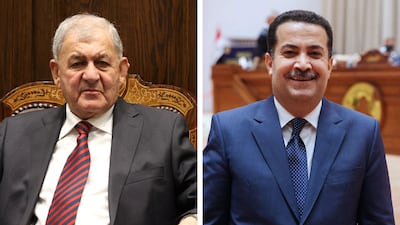For decades, Iraq has had to contend with all manner of challenges, sometimes catastrophes, that would hurt even the most resilient countries. The past 20 years have been particularly troubling.
The country is fast becoming one of the most environmentally stressed nations on the planet due to climate change but also to government negligence and incompetence. The results have ranged from failed harvests to cholera outbreaks, as desperation to access dwindling water supplies forces people to tap into contaminated wells.
The economy of one of the most resource-rich countries in the Arab world is crippled, devastating particularly for its disproportionately young population who, out of a lack of opportunity, are pushed into dangerous trips overseas. Iraqis constitute one of the biggest groups who migrate to Western Europe illegally.
This and other failures have fuelled political anger and driven many to the streets, even, as was recently the case, into the most important halls of power. Only last August protesters stormed the country's parliament.
Political dysfunction has been at the heart of the problems facing Iraq. Elections have not led to representative government.
Last week, more than a year after the parliamentary election, MPs elected Abdul Latif Rashid, a senior Kurdish politician, as the country's new president. This led to Mr Rashid nominating Mohammed Shia Al Sudani, a former mayor and minister who is closely aligned with former prime minister Nouri Al Maliki, to form the next government, in line with the country's constitution.
Even though parliament’s actions exclude the Sadrists who gained the largest share of votes in the 2021 election, the moment was hailed by Iraq's most important allies. After the news, the US State Department issued a statement welcoming the end of the deadlock. "As Iraq’s political leaders form a new government, we encourage them to bear in mind the will of the Iraqi people, who voted for a government responsive to their needs. The US urges all parties to refrain from violence and to resolve differences amicably and peacefully through the political process."
The appointment of these statesmen must be used to deal with the country's difficulties. Mr Al Sudani has pronounced big plans that are the right ones. On Sunday, he vowed to fight corruption after authorities revealed that nearly $2.5 billion was embezzled from just one government agency. It is safe to assume that this has happened in many other departments, but there are concerns about the political vendettas that are behind certain cases. After all, Iraq is one of the most corrupt countries on the planet. It ranks 157th out of 180 nations on Transparency International’s 2021 corruption index.
But even a development as important as this is far from enough. In a more functional political system, Mr Al Sudani would now be able to get on with the job. In actual fact, there is relatively little he can do until he has a new cabinet, a job he was assigned by the president, in line with the country's constitution. He has less than a month to do so. It is uncertain whether he will manage, particularly after Saturday's announcement that the political camp led by influential and populist Shiite cleric Moqtada Al Sadr will not be joining the new government. Mr Al Sudani must show he is serious in the task, and put the national interest ahead of dangerous, delaying politicking.
This is unlikely to be a new dawn for the country, but no one was ever expecting one. The next hurdle for the prime minister-elect is coming in under a month. Only then can the government really start addressing the country's tangible problems.
Responsible politicians in the country must focus on putting aside differences and compromising with their colleagues. Only then will they be able to get out of an endless cycle of empty debating in parliament and start to serve people, the job they were elected to do. It will be seen whether they can do so in a matter of weeks.
























